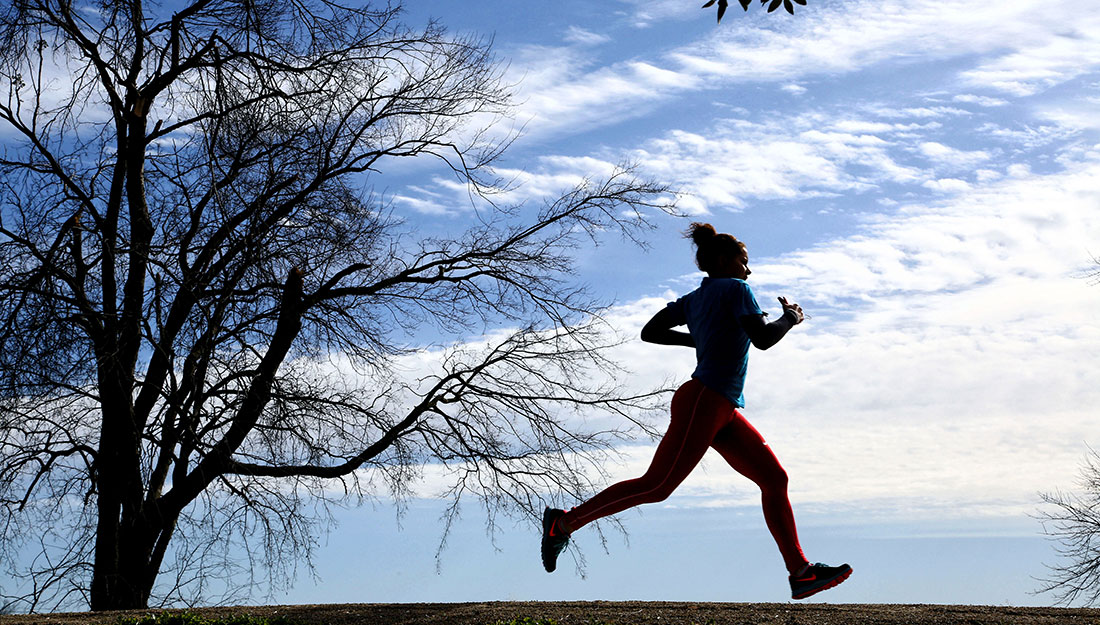- Lauren Thompson
- Healthy Living, Nursing, Show on VR homepage, Trending
Fact or Fiction? Common athletic performance misconceptions
Is your routine rooted in science or hype?

The summer Olympics have concluded, but September and the coming months will hold athletic pursuits just as exciting: high school and college sports. Young athletes engage in a variety of behaviors—both scientifically based and not-so-much—to maximize athletic performance. A Texas A&M College of Nursing expert has the scoop on what’s hype and what isn’t.
Fact: Carbing up to outlast the competition
It’s the night before the state cross country meet, and your coach takes everyone out for a giant meal at the local Italian restaurant. “Eat those carbohydrates; you’ll run faster,” they say. But, will consuming a large plate of fettuccine alfredo really help you win the meet?
“The idea behind carb-loading is to consume enough carbohydrates for maximum endurance,” said Matt Hoffman, a family nurse practitioner and clinical assistant professor with the Texas A&M College of Nursing. “It can be effective and does allow the body to create more glucose, which acts as fuel during long events. Still, the literature shows that for the best results, athletes should carb-load for an extended period of time, not just the day or night before, along with eating balanced meals.”
However, carbing up before an athletic event is really only beneficial for athletes participating in endurance-based sports. For example: If you’re a baseball player who is using energy in shorter bursts, you won’t need as much glucose as athletes like cross country runners, soccer players or long-distance swimmers, who burn energy for longer periods of time.
READ MORE: A beginner’s guide to working out
Fiction: Supplementing with creatine = more gains
For most male athletes, strength gains are king. In almost every high school, you’ll find a football player taking creatine to bulk up and create more muscle. The unfortunate truth: Creatine does not build strength at all.
“Creatine does nothing but create water weight,” Hoffman said. “It essentially binds water to the muscles and inflates them. You may look bigger aesthetically, but creatine does not help you build real muscle mass or become stronger. Taking creatine can also be detrimental to your health, especially if you’re not staying properly hydrated while taking the supplement; this is because creatine taxes the kidneys.”
Fact: Drinking pickle juice relieves muscle cramps
The dreaded muscle cramp. We’ve all experienced them before, and usually at the most inopportune times. The next time you feel a cramp begin, it may be beneficial to reach for a jar of pickles.
“Muscle cramps can happen when we have an electrolyte deficiency,” Hoffman said. “Many people will wake up with leg cramps and go for pickle juice or a spoonful of mustard. If you’re missing electrolytes pickle juice will help, but it won’t solve the problem since you’re receiving only electrolytes and no hydration. It will move your body in the right direction, but you should also drink plenty of water when struck by a cramp.”
Fiction: Sports drinks are better than water
Water is the substance of life, and staying hydrated is the key to optimizing your athletic performance. Many athletes may mistakenly overconsume sports drinks instead of drinking more water—a poor choice that also increases calorie and sugar intake.
“Hydrating with water before and after athletic performance is the best thing you can do for your body,” Hoffman said. “But sports drinks are better to consume after your event or exercise—to replace the electrolytes lost while sweating.”
According to Hoffman, being a conscious label reader is important. “Many sports drinks are very high in sugar,” he said. “There are now lower sugar options available, and, instead of drinking an entire bottle of your favorite sports drink, opt for the powder mix. Adding the recommended scoop of powder helps the body receive the refreshment it needs while cutting out most of the sugar.”
Fact: Eat honey for a quick energy fix
Many athletes swear by eating a tablespoon of honey before a race or game for a quick burst of energy at the start, and Hoffman agrees; the science behind this practice is correct. By doing this, the body is given immediate sugar, which means glucose is quickly absorbed into the bloodstream.
“A good glucose boost is sometimes the pick-me-up an athlete needs to start an event well,” Hoffman said. “Just make sure you’re doing this in conjunction with eating a balanced meal before your performance.”
Fiction: All athletes should take an over-the-counter vitamin supplement
Vitamin D, Vitamin E, Vitamin B—all these vitamins and more are essential for the body to function normally and to perform to the best of its ability. But, if athletes are eating a balanced diet, they’re probably getting most of the vitamins they need from food.
“Over-the-counter vitamins are usually recommended for people with specific vitamin deficiencies, or for those who are restricting their diet, since they aren’t getting these essential nutrients from their food,” Hoffman said. “If you decide to take a vitamin supplement, I always recommend a high quality one. Be mindful, a high quality supplement will cost more.”
Hoffman advised buying vitamins that come in capsules that are clear or transparent. These vitamins, unlike popular one-a-day supplements, are formulated specifically to break down at different times to ensure maximum absorption in different areas of the digestive tract.
“The other one-a-day pills do dissolve, but you don’t know what starts to break down and where,” Hoffman said. “The mineral a certain organ needs may already be gone by the time it reaches the target area for absorption. This is why we always advise speaking with your health care provider when taking different supplements. Any changes made for your health should be supervised by a clinician.”
Media contact: media@tamu.edu


